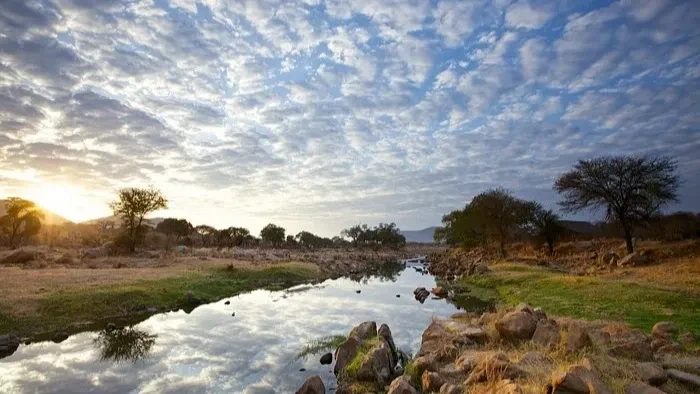Controlled water loss enhances stream flows at the Great Ruaha River catchment

DECLINING water levels in the Great Ruaha River is no longer a phenomenon, thanks to the Resilient Natural Resources for Growth Project (REGROW) for improving drainage systems at the Madibira irrigation scheme in Mbeya’s Mbarali District.
The $150 million (350bn/-) World Bank funded project that aims to improve tourism in the southern circuit includes construction of a 2.9 kilometre primary canal and 10.6 kilometre secondary canal at a popular rice growers’ scheme in Mbarali.
Under the project which is implemented by the Ministry of Natural Resources and Tourism, farmers were also trained on sustainable rice farming and efficient usage of water to protect the existing ecosystem.
Ruaha National Park Conservation Commissioner, Godwell Meing’ataki said the government’s decision to improve water drainage systems for sustainable water use at the Madibira irrigation scheme is commended since the area is one of more seven small rivers that flow to the Great Ruaha River.
“Our park depends solely on the existence of this River; there are a variety of wild animals, birds, fish and hippos whose survival hangs on the presence of the river. Previously, the river used to go without water for between one and six months, a situation which has now normalized,” said Meing’ataki.
He said there have been a number of interventions to save the river from extinction which includes making the Usangu valley part of the park, adding the valley forms the headwater catchment of the Great Ruaha River.
According to him, the river is also important for the country’s development as 25 percent of its water goes to Mtera and Kidatu dams which generate electricity. He added that 15 percent of water that goes to the Julius Nyerere Hydropower Project (JNHPP) is from the river.
“We are thankful to the government through the REGROW project for training rice farmers on sustainable water use as well as making the Usangu valley part of the park. All these have largely helped to protect the ecology, thus enhancing water flows,” he remarked, adding that more than 60 kilometers of the river is within Ruaha National Park.
Michael Mjola, is one of the paddy farmers at the Madibira irrigation scheme which has 3252 hectares in total, he said water loss has been controlled as farmers use water periodically to allow continuation flow to the river,
“We were trained on sustainable water use; we only release water into our farms when necessary. This has guaranteed us availability of water throughout the farming season. Before improvement of the drainage systems, people could even fight for water to irrigate their farms. We now have an arrangement where each of us gets water periodically,” he added.
Mjola, a resident of Mhango village, Madibira ward in Mbarali District said that with the improvements farmers are now harvesting between 12 and 15 tonnes per hectare. He said previously, one could hardly get between 4 and 8 tonnes of rice per hectare.
Madibira Ward Councilor, Juma Msiminyungu said: “We are thankful to President Samia Suluhu Hassan for bringing us this project. Farmers are no longer fighting for water and can harvest more compared to the past three years.”
Vitalis Msungwite, Chairperson of the Madiblra Agricultural Marketing Co-operative Society said construction of the irrigation canals has contributed to reduced farming costs from 28m/- to 2.1m/- which were used to dig the canals.
REGROW Coordinator from the Ministry of Natural Resources and Tourism, Aenea Saanya said the project is of great importance to the nation as apart from improving tourism in the southern circuit, it enhances food security.
“Improved rice harvests would not only benefit farmers, but the nation through exports. REGROW is also part of the various measures to mitigate the impacts of climate change.
Top Headlines
© 2024 IPPMEDIA.COM. ALL RIGHTS RESERVED






















